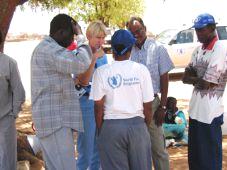Darfur violence overwhelms relief workers
July 10, 2007 (UNITED NATIONS) — Violence has escalated in Sudan’s Darfur region since January, throwing another 160,000 people out of their homes and forcing 4.2 million people, about two-thirds of the population, to go on relief aid, the United Nations reported on Tuesday.
 Some 2.1 million people have been uprooted from their villages in addition to the more than 200,000 who have fled the country, mainly to neighboring Chad, the U.N. Office for the Coordination of Humanitarian Affairs, known as OCHA, said.
Some 2.1 million people have been uprooted from their villages in addition to the more than 200,000 who have fled the country, mainly to neighboring Chad, the U.N. Office for the Coordination of Humanitarian Affairs, known as OCHA, said.
Particularly worrying are attacks against relief workers, which have increased 150 percent over the past year, OCHA said.
In June, one out of every six convoys leaving provincial capitals in Darfur was hijacked or ambushed by “armed groups,” a term usually applied to bandits or anti-government rebels. Since January, some 64 vehicles have been hijacked, with 132 staff temporarily detained, often at gunpoint.
“This kind of lawlessness by armed groups of different political affiliations has forced relief organizations to suspend programming and relocate out of dangerous environments on 15 occasions, temporarily depriving over 1 million beneficiaries of life-saving assistance,” OCHA said.
There are 13,000 relief workers in Darfur trying to reach 4 million people. As a result of the violence on the ground, aid workers are forced to rely on expensive helicopter transport to keep operations going, OCHA said.
“While political and peace-keeping initiatives have made some progress, and bureaucratic obstacles to humanitarian work have decreased, these violent attacks against aid workers are jeopardizing the whole operation,” said John Holmes, the head of OCHA and the U.N. emergency relief coordinator.
What was needed was an effective cease-fire, Holmes said, adding that “rebel groups and the government could and should choose now to stop the violence.”
Darfur’s three main rebel factions have split into more than a dozen groups in disputes that have fueled lawlessness in the remote, arid region.
U.N. and African Union envoys have set a self-imposed August deadline to launch peace negotiations and have called an international meeting in Libya for July 15-16 to help move the uphill process along.
Some 200,000 people are estimated to have died in the conflict, which began in 2003 when mostly non-Arab rebels took up arms after accusing the central government of neglect.
Khartoum then mobilized Arab militias, called Janjaweed, accused of rape, pillaging, arson and murder to quell the revolt.
Sudan has agreed to a combined United Nations-African Union peacekeeping force of 20,000 troops and police, which is not expected to be in place until next year, to bolster the underequipped Africa Union force of 7,000, now in Darfur.
(Reuters)
Office for the Coordination of Humanitarian Affairs
The Humanitarian Community in Darfur under Increasing Pressure
(New York: 10 July 2007): Despite repeated appeals from UN agencies and non-governmental organizations (NGOs) operating in Darfur, continuing violence and targeting of civilians have displaced nearly 160,000 people so far this year, pushing the total number of internally displaced people to 2.1 million. Security incidents involving internally displaced people have more than tripled. The total number of civilians requiring relief assistance has reached 4.2 million, or nearly two-thirds of the entire Darfur population.
Particularly worrying is that attacks against the relief community have increased 150% in the past year, threatening the lifeline to this ever-increasing number of displaced and conflictaffected people. In June, one out of every six convoys that left provincial capitals in Darfur was hijacked or ambushed. Since January, some 64 vehicles used by agencies have been hijacked, with 132 staff temporarily detained, often at gunpoint. This kind of lawlessness by armed groups of different political affiliations has forced relief organizations to suspend programming and relocate out of dangerous environments on 15 occasions, temporarily depriving over one million beneficiaries of life-saving assistance
Since the beginning of the year, more than 35 relief convoys have been ambushed and looted, and their precious cargo stolen. Four Darfuris working to help relief agencies undertake projects have been killed. Eleven soldiers from the African Union Mission in the Sudan (AMIS) have also been killed.
“While political and peace-keeping initiatives have made some progress, and bureaucratic obstacles to humanitarian work have decreased, these violent attacks against aid workers are jeopardizing the whole operation,” said John Holmes, United Nations Under-Secretary-General for Humanitarian Affairs and Emergency Relief Coordinator. “All parties have to act now to stop these attacks and bring the perpetrators to justice,” he emphasized.
There are some 13,000 relief workers in Darfur trying to reach a total of four million people with life-saving assistance. As a result of insecurity on the ground, aid workers are forced to rely on expensive helicopter transport to keep operations going in many areas.
“Every day, more people need our help, yet humanitarian colleagues are under increasing threat from all sides,” Mr. Holmes said. “Obviously, we will not give up – the needs are too great. We will continue to adapt operations to ensure that the most vulnerable in Darfur receive at least some relief,” he said. “But what we most need is an effective ceasefire. This is possible – the rebel groups and the government could and should choose now to stop the violence.”
